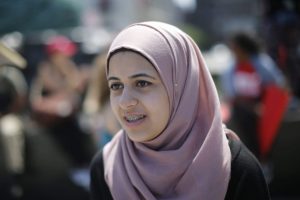CLEVELAND – In a park loaded with hundreds of people who came to protest the message of fear and segregation promoted by Donald Trump supporters in Republican convention, a Muslim woman stood alone with red flower pens.
“It doesn’t have to be us versus them,” Rose Hamid, a Muslim from Charlotte, told a few dozen listeners, The Charlotte Observers reported.
“These terrorist groups are not following the Islamic doctrine.”
For the past months, Donald Trump’s rhetorics have spurred a wave of anti-Muslim sentiment in the United States, from a complete ban of Muslims to “extreme vetting” in a CBS News interview earlier this week.
Anticipating a huge audience in this week’s Republican National Convention, Hamid wanted to send a clear message: Islam is not a violent religion.
Her remarks came an hour after the head of the nation’s largest Islamic group delivered a similar message a block away.
Nihad Awad, executive director of the Council on American-Islamic Relations, told reporters, “We all have the same love for and commitment to America.”
On Monday, Hamid donned a white hijab, as she handed out flower pens for a chance for one-on-one conversations.
“It’s important to stand up and say, ‘This is not who we are,’ ” she said. “We are people who want to come together and make things better.”
As she spoke, a group of protesters behind her shouted and held signs with slogans such as “Every real Muslim is a jihadist” and “Muhammed is in hell.” One wore a T-shirt that said, “Proud to be an Infidel.”
“I knew there would be people like these folks,” she said later. “I don’t know how to combat hate other than with love.”

“(Trump) has legitimized these negative views that people had before,” Sondos said.
Fear
Not far from Hamid’s red flowers, Sondos Mishal, a 17-year-old Muslim, stood alone in her rose hijab to share her story.
“I wanted to show people how Muslims are – just ordinary people,” Sondos, whose shy smile reveals her braces, told The Buffalo News.
“We’re not the image Donald Trump is giving off to everyone in the media. We’re just like any regular citizen. The only difference is just our belief. He’s categorizing this giant group of people as terrorists – all these negative things – and it’s affecting our daily lives.”
Sondos moved to the United States from Palestine at age 8.
Learning English, after about a year and a half, she started to feel at home. This feeling of belonging, safety and security lasted until Trump took it away with his controversial message.
“It’s affected me personally,” she said.
“My family is always worried. I have to go around with this slight fear because my family is like, ‘Don’t be out alone and don’t be out at night.’ That’s hard in your everyday life. I’m a student. If I’m out studying, when I get home late, I always have in my mind, ‘I might be in danger right now.’ ”
Last month, Sondos said, her cousin was followed by a man for 40 minutes.
“(Trump) has legitimized these negative views that people had before,” she said.
“He made them more real.”